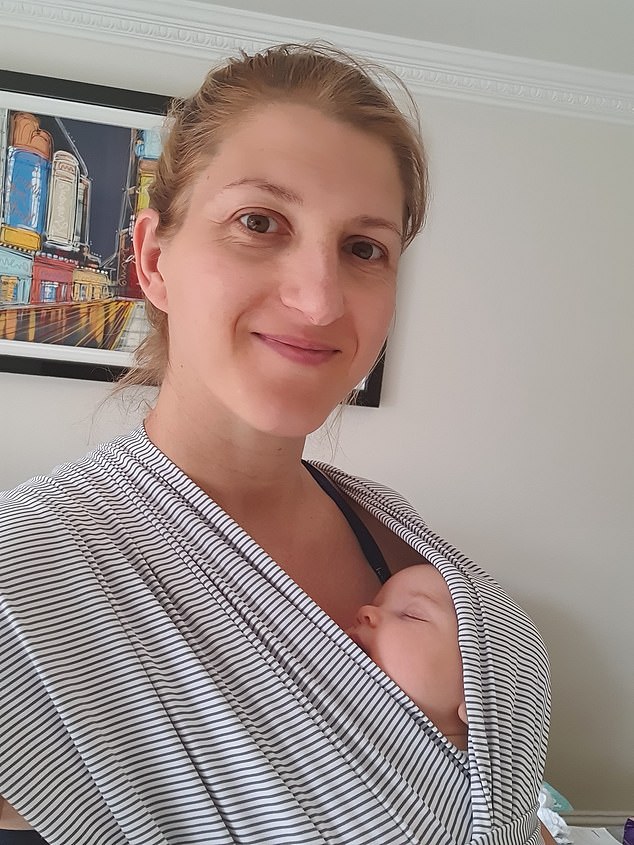A new mother who was told she couldn’t work from home for part of the week by her boss was the victim of sex discrimination, a tribunal has ruled.
Noemi Orban sent a request to outdoor clothing specialist Rohan Designs to spend three days a week working at home after struggling to find a nursery place while she was still on maternity leave.
But this was ‘firmly’ rejected by managing director Ian Palmer as he thought her production manager role required a ‘regular presence’ in the office.
He argued allowing the production team to work remotely during the pandemic had already ‘adversely affected’ performance, resulting in a £500,000 bill for remedial work and £2 million in lost sales over a jacket that had to be removed from sale due to quality issues.
Mr Palmer also said Ms Orban’s absence would put ‘unreasonable pressure’ on her colleagues and set a precedent for other staff.
Ms Orban was eventually allowed to work shorter hours on reduced pay but this was the ‘final straw’ in the ‘soured’ relationship with her employer and she resigned before launching a claim against the company.
Upholding her sex discrimination claim, Employment Judge Andrew Spencer said primary childcare responsibility still ‘falls largely on women’ and there was ‘ample work’ within Ms Orban’s role that was ‘suitable’ to be done from home.
He added: ‘We find that the respondent’s PCP [provision, criterion, or practice] was a disproportionate means of achieving that legitimate aim.
‘In simple terms, they went too far and were too inflexible.’


Ms Orban, 43, told MailOnline: ‘It’s a well-known and accepted fact that women are still responsible for childcare, therefore they need more flexibility than men.’
Adding that she had to change career and now worked for National Highways, she added: ‘I try to avoid thinking about it [the case] because I have bad memories.’
Her husband, Simon Platt, 46, a management consultant who represented her at the hearing in Cambridge, added: ‘The employer wasn’t open to any kind of discussion or compromise. Noemi wanted to be a working mum doing the job she loved.’
Ms Orban, who is from Hungary, added: ‘The toll it has taken on me I can’t even describe. It was just awful.’
The case will fuel the debate about working from home, which has become commonplace since lockdowns began in 2020.
Business leaders argue it affects productivity but many workers claims it helps with the work/life balance and eases childcare issues.
Ms Orban told bosses at the company in Milton Keynes, Buckinghamshire, that she was pregnant in January 2021 and intended taking her full 52 weeks of maternity leave from May.
She gave birth to her daughter that autumn but found long waiting lists at local nurseries when she made enquiries.
After contacting her line manager in December to discuss flexible working hours on her return she was given a request form on which she asked to work from home three days a week.


A similar arrangement had been ‘effective’ during Covid lockdowns, she told the tribunal.
But in February 2022, Mr Palmer – a former HR manager at the firm – emailed all staff to say the government’s decision to relax rules on Covid testing and the need to isolate meant there should be ‘no expectation to work from home’ from April 1.
Ms Orban’s request was turned down on the grounds it would ‘inhibit the acquisition and sharing of information’ in the workplace, the ‘unreasonable pressure’ it would put on colleagues, and the signal it would send to other staff.
She appealed and asked for two days at home each week but was again turned down.
The tribunal said this was ultimately due to Mr Palmer’s belief that ‘working from home for this team has had a detrimental impact on the business and its performance’
They heard this was connected to problems with the jacket that had to be withdrawn from sale but concluded these were actually caused by issues with the supplier.
Ms Orban, who has since had another child, eventually returned to work ‘under protest’ in May 2022 after being told she could work between 8am to 3pm in the office on reduced pay.’
But she lodged a formal grievance before quitting the following month and starting legal action.

Employment Judge Spencer added: ‘The day will hopefully come when tribunals can no longer assume that women will be disproportionately adversely affected by such requirements as a refusal to permit home / remote working.’
Other claims of maternity discrimination and unfair dismissal brought by Ms Orban were dismissed. Compensation will be agreed at a later date.
Rohan Designs were contacted for a comment.
The number of people working from home more than doubled between late 2019 and March 2022, from 4.7 million to 9.9 million.
Some 28 per cent of the UK work force is now in hybrid work, according to the latest data, with 13 per cent fully remote and 44 per cent commuting to the office.
Last month, recruitment giant Reed said bosses were more likely to give pay rises and promotions to employees who were physically present in work places.

